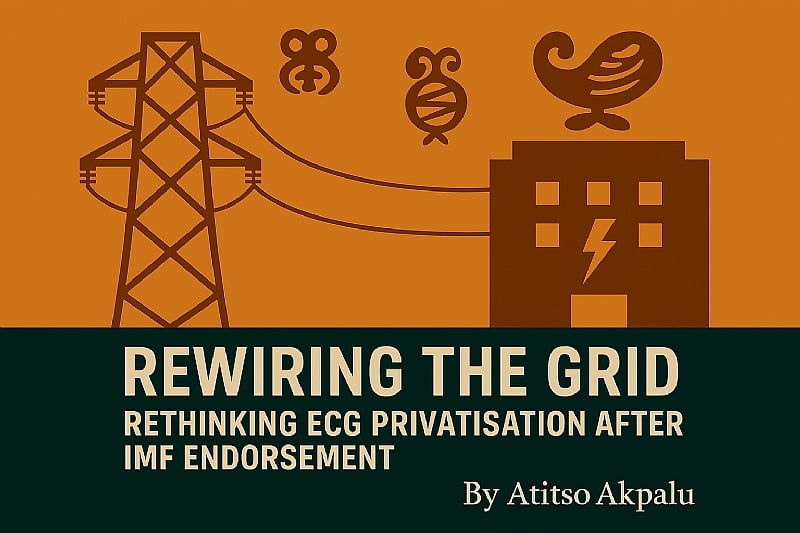⚡The International Monetary Fund (IMF) has catalyzed fresh dialogue around Ghana’s energy future by endorsing the privatisation of the Electricity Company of Ghana (ECG). The endorsement arrives against the backdrop of a looming $2.2 billion financial shortfall in the energy sector by end-2025, driven by systemic inefficiencies, technical losses, tariff stagnation, and costly fuel dependence.
While the IMF touts privatisation as a necessary reform to inject investment, improve efficiency, and reduce fiscal strain, Ghana must approach this proposal with nuance — balancing urgent economic needs with long-term sovereignty and equity considerations.
🔍 The IMF’s Position and Potential Upside
The Fund’s rationale is largely economic: ECG’s financial hemorrhaging threatens Ghana’s macroeconomic stability. Privatisation is framed as a path toward:
Infusing capital for infrastructure upgrades Enhancing operational discipline and metering systems Reducing government subsidies and liabilities Introducing innovation through private sector efficiency
In theory, this could modernize ECG’s infrastructure, optimize service delivery, and stabilize energy pricing. Yet, the transition must be guided by more than fiscal arithmetic — it must reflect cultural values and civic priorities.
⚠️ Risks Inherent in ECG Privatisation
The prospect of reform is not without peril. Ghana’s previous attempt to privatise ECG through the Power Distribution Services (PDS) deal in 2019 remains a cautionary tale. That concession collapsed under scrutiny, leading to the loss of $190 million in MCC funding and eroding public trust.
Risks include:
Sharp tariff hikes that may marginalize low-income households Workforce downsizing and disruptions to ECG’s institutional memory Private neglect of rural and peri-urban areas deemed unprofitable Regulatory capture and weakened oversight capacity Loss of sovereign control over a strategic national asset
These dangers call for a rigorous, transparent framework and robust civic engagement before any reform is enacted.
🌍 Lessons from Global Energy Reforms
Ghana is not alone in navigating the complexities of energy privatisation. Other countries provide critical lessons:
Nigeria’s post-privatisation landscape has been plagued by outages, billing disputes, and regulatory lapses. India’s early efforts in Orissa suffered investor exits due to weak planning and public resistance. The UK saw initial efficiency gains reversed by rising costs and public backlash, leading to partial re-nationalisation. In contrast, Chile and Peru achieved notable success through phased public-private partnerships, strong regulatory oversight, and gradual reform.
These examples reveal that structure matters. Timing, transparency, and stakeholder alignment are key determinants of success.
🔧 Fixing the System Before Restructuring
Before inviting private actors into ECG, Ghana must first address internal inefficiencies to build credibility and ensure reform success. Key actions include:
Reform tariff structures
Strike a balance between cost recovery and affordability Avoid political pricing distortions that undermine sustainability
Reduce technical and commercial losses
Invest in smart grid systems and digitized metering Improve maintenance protocols and theft prevention
Streamline coordination between ECG and GRIDCo
Eliminate transmission bottlenecks and avoid planning overlap Clarify operational mandates and strengthen inter-agency synergy
Strengthen regulatory oversight
Empower PURC and Energy Commission with independence and adequate funding Enhance legal authority to monitor tariffs, service delivery, and external partnerships
Audit and disclose ECG financials
Conduct regular audits and publish financial statements Foster transparency and restore public trust
Consolidate financial architecture
Reduce over 85 fragmented bank accounts to a single corporate account Improve fund tracking, curb misappropriation, and simplify auditing⚡📘
🛤️ A Roadmap Rooted in Culture and Governance
Any path forward must be distinctly Ghanaian — shaped by cultural pride, civic equity, and long-term resilience. Recommendations include:
Embracing Public-Private Partnerships
Maintain majority state ownership while outsourcing operations under performance-based contracts. Tie benchmarks to rural electrification, job retention, and indigenous technology development.
Citizen Engagement and Civic Education
Launch regional forums, diaspora consultations, and digital outreach campaigns. Incorporate Adinkra symbolism and storytelling to anchor reforms in cultural context and enhance transparency.
Protecting the Vulnerable
Implement social tariffs and energy subsidies for CHPS compounds, schools, and low-income communities to prevent energy exclusion.
Strengthening Institutions
Reform PURC and the Energy Commission to serve as watchdogs, not weak intermediaries. Introduce parliamentary oversight for privatisation contracts to safeguard public interest.
Preserving Sovereignty
Ensure that all agreements contain sovereignty clauses that protect Ghana’s energy assets from undue external influence.
Channeling Reform Gains into National Development
Allocate privatisation proceeds to strategic initiatives: expanding telemedicine, supporting youth-led energy startups, and boosting renewable grid expansion.
🕊️ Conclusion: Powering Ghana with Integrity
Privatisation is not inherently wrong — but it must be pursued deliberately, transparently, and with a firm commitment to equity. Ghana’s energy sector should be more than a fiscal liability; it must become a source of empowerment, innovation, and legacy.
This moment is an opportunity to realign national energy policy with the values that matter most: cultural authenticity, civic dignity, and intergenerational justice. Whether ECG is privatised, restructured, or revitalised from within, the true measure of success will be how Ghana lights its future — inclusively, sustainably, and with pride.
Retired Senior Citizen
Teshie-Nungua
[email protected]


